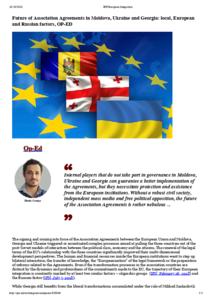Future of Association Agreements in Moldova, Ukraine and Georgia: Local, European and Russian Factors
Future of Association Agreements in Moldova, Ukraine and Georgia: Local, European and Russian Factors
Author(s): Denis Cenuşă
Subject(s): Civil Society, International relations/trade, Socio-Economic Research
Published by: CEPS Centre for European Policy Studies
Keywords: Association Agreements; NGOs; political class;
Summary/Abstract: The output of the Association Agreements will always be low if political corruption is not overcome, while the electoral cycles do not yield parliamentary majorities and upright governments. It is essential for the reform process to be directed by those who aim not to obtain personal benefits, but to modernize the country and to bring this closer to the EU’s positive standards. // Both the EU and Russia have incentives and constraints that can influence the direction of the Association Agreements. Even if the European factor is beneficial to the reform process, this necessitates recalibration and uniformity in addressing similar problems in the three countries, like the oligarchic regimes and others. The Russian factor is disinterested in the functionality of the Association Agreements, but does not perceive these as a major danger as it sees how challenging, hesitating and dependent on the yet corrupt human factor the reforms are. // Internal players that do not take part in governance in Moldova, Ukraine and Georgia can guarantee a better implementation of the Agreements, but they necessitate protection and assistance from the European institutions. Without a robust civil society, independent mass media and free political opposition, the future of the Association Agreements is rather nebulous.
Series: 3 DCFTAs OP-ed
- Page Count: 4
- Publication Year: 2018
- Language: English
- Content File-PDF

